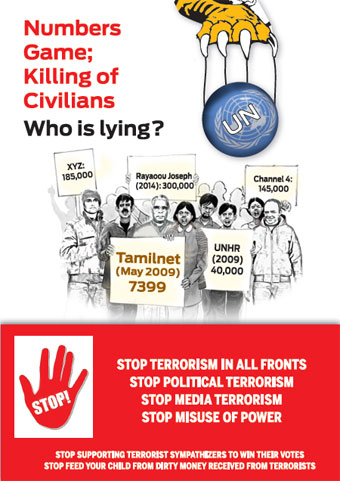SRI LANKA’S PRESIDENTIAL ELECTION AND THE TAMIL DILEMMA – OPED
(Courtesy of Eurasia Review)
Will there be a Tamil boycott of Sri Lanka elections? Last week, in an unexpected move, Maithripala Sirisena, General Secretary of the Sri Lanka Freedom Party, was declared the common opposition candidate for the forthcoming presidential election scheduled to be held on January 8, 2015. Now, it is clear that the presidential election will be a two-horse race between President Mahinda Rajapaksa and Maithripala Sirisena, although, as usual, there will be many more candidates on the list. Until Sirisena’s entry was announced, the Sri Lankan Tamil position vis-à-vis the election was simple and straightforward. They would have voted for a UNP or UNP approved candidate without even the endorsement of the TNA. The Sirisena candidacy has altered this situation considerably.
Sirisena’s entry as the common candidate has created two specific dilemmas within the Tamil community. First, since the end of the war, a majority of the Sri Lankan Tamils have rejected not only the president, but also the government and government allies. They have resisted voting for the government and government-sponsored parties or groups. They assume that the government is responsible for the post-war difficulties they encounter.
This was one reason why the Eealm People’s Democratic Party (EPDP), despite undertaking substantial economic development projects in the North, could not win elections. Therefore, voting for the incumbent president in the presidential election was not an option for a majority of them. If they participate in the election, they have to vote for a person who until recently was part of the very same government they do not want to support. Maithripala was not an ordinary member. He was one of the leaders and he vehemently defended the government policies, which the Tamils see as problematic. This factor could mute their enthusiasm for the election and voting.
Second, the most important predicament might emanate from the alliance with the Jathika Hela Urumaya (JHU). JHU is a Sinhala-Buddhist party. By exclusively promoting Sinhala-Buddhist interests, it has become an anti-minority, especially anti-Tamil political entity. Of course, the JHU opposed the LTTE and its politics. It also opposed civilian political control of the Northern Province after the provincial council election in the North. The party also is clear about its opposition to devolution of power of any sort. The Tamil people view the JHU as a Sinhala supremacist political party (and the JHU believes that the Tamils and TNA are racist as well). Therefore, an alliance with the JHU is bound to create doubt about the promise of the opposition alliance. This would force the Tamils to think twice before voting for Sirisena.
Also, a segment of the Tamil community do not know much about Sirisena as he was not involved directly in the Tamil issues. The Tamil issues were handled either by top leadership of the present government or through the allies like the EPDP. It is not even clear if the Sinhala community has an in-depth understanding about Sirisena’s background and principles. The Sinhalese are, however, curious and seem keen to get to know the man. This keenness may be lacking within the Tamil community. Although this factor might help mitigate possible Tamil hostility towards Sirisena, they will not be too enthusiastic about going to the booth and voting for a man they do not know much about.
It is interesting to note that the TNA so far remains evasive on its support for the common opposition alliance. According to one news report, TNA leader Sambandan has stated that the party is exploring all of its options before making a final decision. Another report indicated that the party will “indirectly” support the common candidate.
These two positions are notable because, the TNA does not have the luxury of deciding between the two candidates. It can only decide between participating in the election and boycotting. A formal, or even informal, boycott would amount to supporting President Rajapaksa. Given the voting patterns, Rajapaksa can win without Tamil votes, but Sirisena cannot. Therefore, he should be more concerned about Tamil votes than the government.
In theory, the TNA can decide not to formally endorse Sirisena and as stated in the news report, agree to extend its support informally or indirectly. This could happen if the agreement between Sirisena and the JHU contains any real or perceived anti-minority or anti-devolution provisions. Such a situation could also be illustrated as a setback for Sirisena because given the possible Tamil apathy towards the election, getting Tamil people to go to the polling booth and vote might need some serious encouragement. The TNA will be able to do that.
A segment of the Tamil community comprising mostly radical nationalists who still believe in separatist ideologies, assume that presidential elections are an affair of the Sinhalese and the South — the Tamil do not have to take part and should ignore them is the idea. This assumption formed the basis of the LTTE enforced boycott of the 2005 presidential election. A vast majority of the Sri Lankan Tamil diaspora and a group within Sri Lanka still subscribe to this notion. Therefore, there will be calls to boycott the 2015 election as well.
There is however, an increased understanding within the Tamil community that they need to participate in national elections in order to shape their political future. This facilitated greater Tamil participation in the 2010 presidential election. A change of government at this point in time could create fresh space for constructive politics enabling them to break out of the present stalemate. Therefore, a formal boycott is highly unlikely, unless there is a clandestine understanding between the TNA and President Rajapaksa. However, an informal and unforced boycott could take place if the Tamils do not feel the benefit of voting for Sirisena.
The point therefore, is that Sirisena cannot take Tamil votes for granted or assume that the Tamils will vote for him automatically. Since Mano Ganesan has already aligned himself with the grand opposition alliance, a majority of the Western province Tamils will vote for Sirisena. The opposition alliance might need a concerted effort to convince the Tamils to vote for Sirisena and might need a concrete campaign in the North-East. A serious publicity campaign in the North-East to introduce the candidate and his policies would address the first issue. Formally having the TNA on its side will make this task easy.
The second issue, i.e the doubts created by the alliance with the JHU, might need careful interaction with the monks. It should not impart the impression that the agreement between Sirisena and the JHU contain provisions against the Tamils. Sirisena in fact is in a better bargaining position with the JHU. The JHU has already left the government without negotiating with the opposition candidate. Therefore, it will negotiate from a position of weakness. Otherwise it needs to stay neutral in this election, which will not serve its political objectives. Also, the JHU will be immensely helpful to target the Sinhala-Buddhist votes. Therefore, Sirisena, while accommodating JHU’s good governance related concerns, could make sure that the opposition coalition does not lean towards anti-minority tendencies. An informal Tamil boycott of the presidential election or apathy would prove to be costly for Sirisena.
Dr. S. I. Keethaponcalan is Chair of the Conflict Resolution Department, Salisbury University, Maryland.
859 Viewers








